Before Sheila Bedi starts her law school class, the Northwestern University professor’s nearly 20 students make last-minute touch-ups to their final presentations. Some look over their notes, while others chat with their neighbors.
The first group goes to the front of the room, painted purple and white with graduation photos on the walls. They discuss mass incarceration, from its ties to slavery to the prison abolition movement. Questions are asked, feedback is given and another group takes their place.
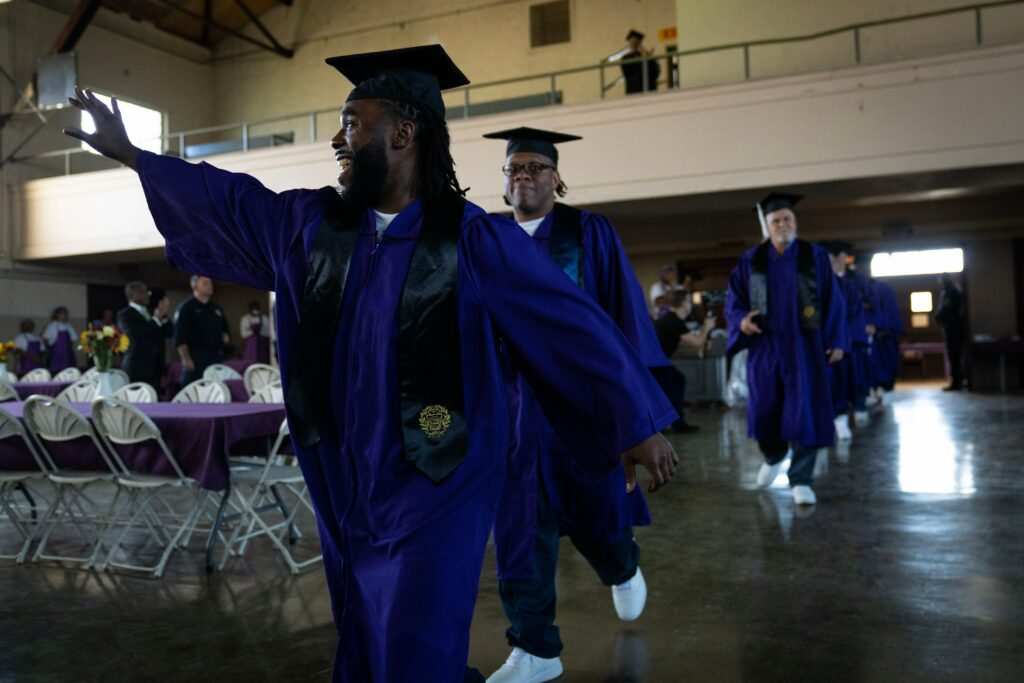
While it might sound like a normal college class, Bedi isn’t teaching at the Evanston, Illinois, campus, and prisons aren’t something her students have only read about in a textbook.
More than 450 prisoners are housed inside Stateville Correctional Center in Crest Hill, about an hour drive from Chicago, according to the Illinois Department of Corrections. Inside the men’s maximum security prison, in a couple of rooms filled with desks and chalkboards, is the country’s only bachelor’s degree-granting program for incarcerated students offered by a Top 10 university.
Last month, 16 men became the first group to graduate from Northwestern’s Prison Education Program, an accomplishment they and their professors hope will lead to a second chance. Experts believe similar educational offerings could reduce recidivism rates and save taxpayers money statewide.
“It all hasn’t hit me yet, still. I know it’s a great thing, it’s a great feeling,” one of the graduates, Taurean Decatur, told the Tribune recently at Stateville. “It’s one of the best feelings of my life, like I did it. I wish I could put it on a T-shirt.”
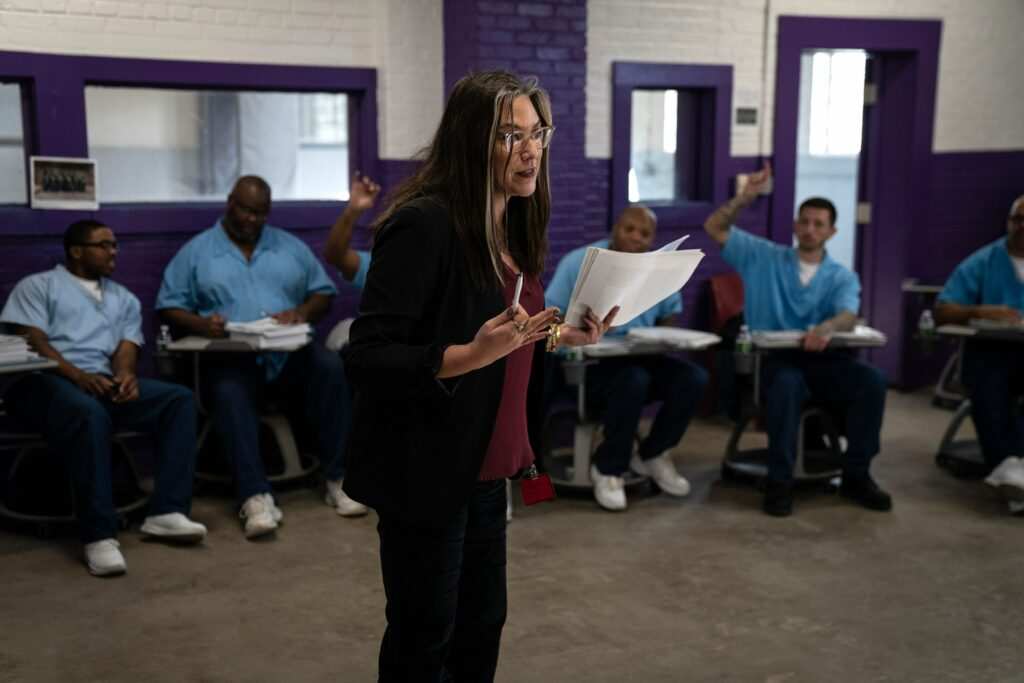
Decatur, now 33, is serving a 105-year sentence for first-degree murder and attempted murder after he fatally shot a man and injured another outside a bar in Broadview in 2009. Taking someone’s life, Decatur said, puts him in a “moral deficit” with himself and with God.
“It’s time to do everything that I can to pay society back, at least a fraction of what I’ve taken from not only my victim and his family, but society as a whole,” he said. “I became a statistic in the wrong way.”
Education, he felt, was an important step. Growing up on the city’s West Side, Decatur dreamed of playing football at Northwestern. He admits that academics weren’t something he took especially seriously, until 2018. When he got the application for the prison education program, he thought it was a chance to “feed (his) mind” behind bars.
He learned psychology and sociology, playwriting and chemistry. One class that stood out is “Sociology of Chicago,” taught by Mary Pattillo, he said. In the course, he traced poverty and disinvestment in Chicago’s majority Black and Latino neighborhoods, helping him make sense of the “toxic” parts of the city he saw as a young Black man and not be ashamed of his skin color. He jokes that he now labels himself a “freaking nerd.” It’s impossible to view the world in the same way, he said.
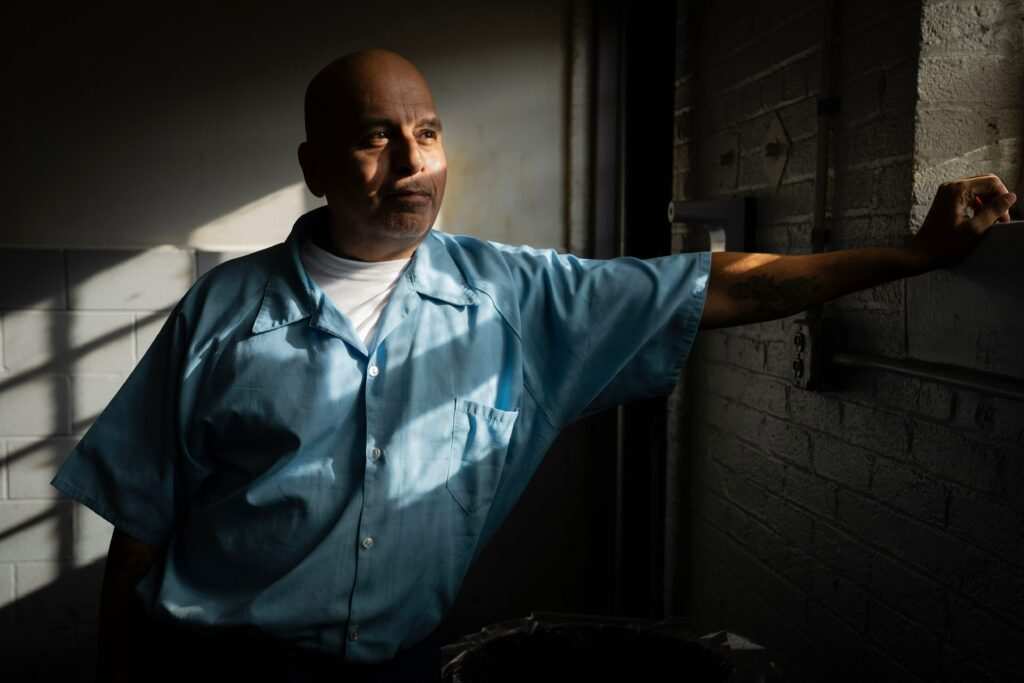
“You can have differences. Agree to disagree, and it doesn’t have to be a yelling match. With all due respect, it’s OK,” he said. “When we was coming up it was like anybody that didn’t look like us, didn’t act like us, didn’t think like us, was opposition.”
Decatur said it’s also helped him get closer to his kids, two 14-year-olds. Decatur has been incarcerated their whole life, acknowledging that he’s not able to be a “hands-on” father in the way they deserve. But he said everything he does now is to make them proud.
When his son and daughter started learning fractions, Decatur said he was able to help them at their monthly in-person visits. It was amazing how smart they were, he added. While they may not see him write papers or pore over a textbook late at night, Decatur said he hopes he’s teaching them that “it’s what we do with (our) mistakes that defines who we are and where we’re going.”
His daughter even bragged to her teacher that she was going to her father’s Northwestern graduation, Decatur said. He laughs when he recounts that she neglected to tell the teacher he was in prison.
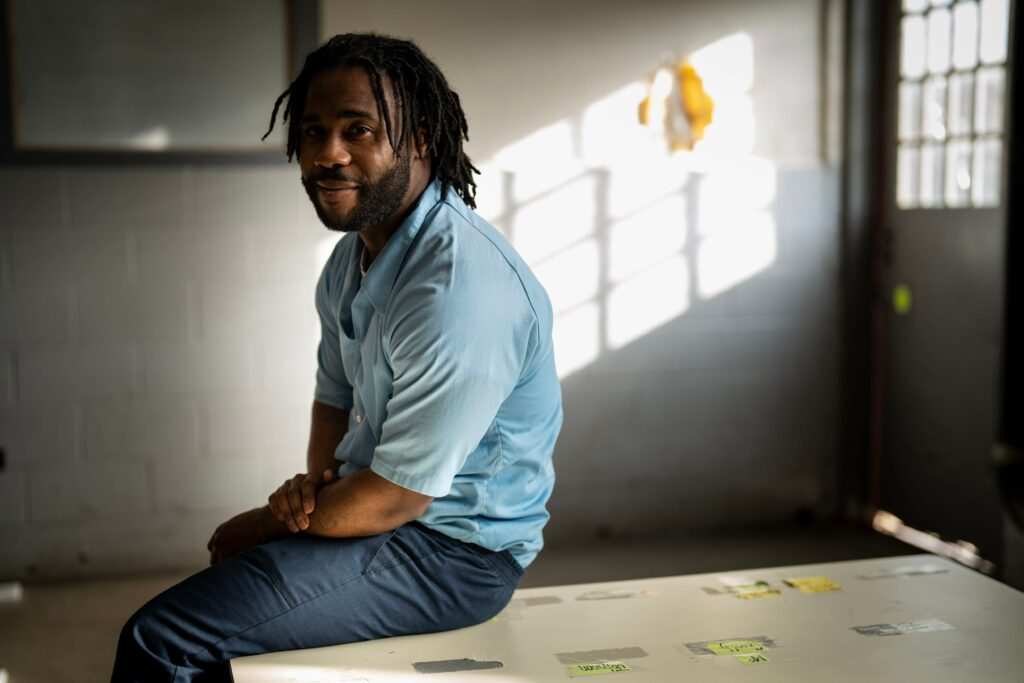
“Both of their eyes were wide-awake … they saw how much this community loves us and supports us, and they know it comes from hard work,” he said. “People don’t show you respect like that like a handout.”
‘A place of second chances’
Jennifer Lackey, a philosophy professor, founded Northwestern’s prison program in 2018, eventually partnering with Oakton College to offer students an associate in general studies degree. About three years later, the program accepted its inaugural class of bachelor’s degree-seeking students at Stateville.
The program is also open to incarcerated women at Logan Correctional Center, about 30 miles north of Springfield. Roughly 100 students at the two facilities are working toward a Bachelor of Science degree with a major in social sciences, Lackey said.
Lackey calls bachelor’s degrees the “gold standard of prison education.” They give students more job opportunities, access to faculty references and a built-in support system, setting students up for success on the outside, Lackey said.
There’s some research that supports her ideas. A 2014 study from the RAND Corporation and U.S. Department of Justice found that inmates who participate in correctional education programs have a 43% lower chance of returning to jail. The chances of getting a job post-release also increase by 13%, the study found.
Another study suggests that every $1 investment in prison education reduces incarceration costs by $4 to $5 in the first three years after release, when the likelihood of returning to prison is highest.
“We’ve seen over and over again that the punitive approach that the United States has taken for decades, isn’t working, and it’s really time to invest in other ways of supporting people who are behind bars,” Lackey said.
For James Soto, 62, this sentiment hits close to home. Soto has been incarcerated for more than four decades after being sentenced to life in prison for two 1981 murders in Little Village. Soto, who has maintained his innocence, carried his transcript in his pocket. He hopes the document, which shows he graduated magna cum laude, will help at his parole hearing.
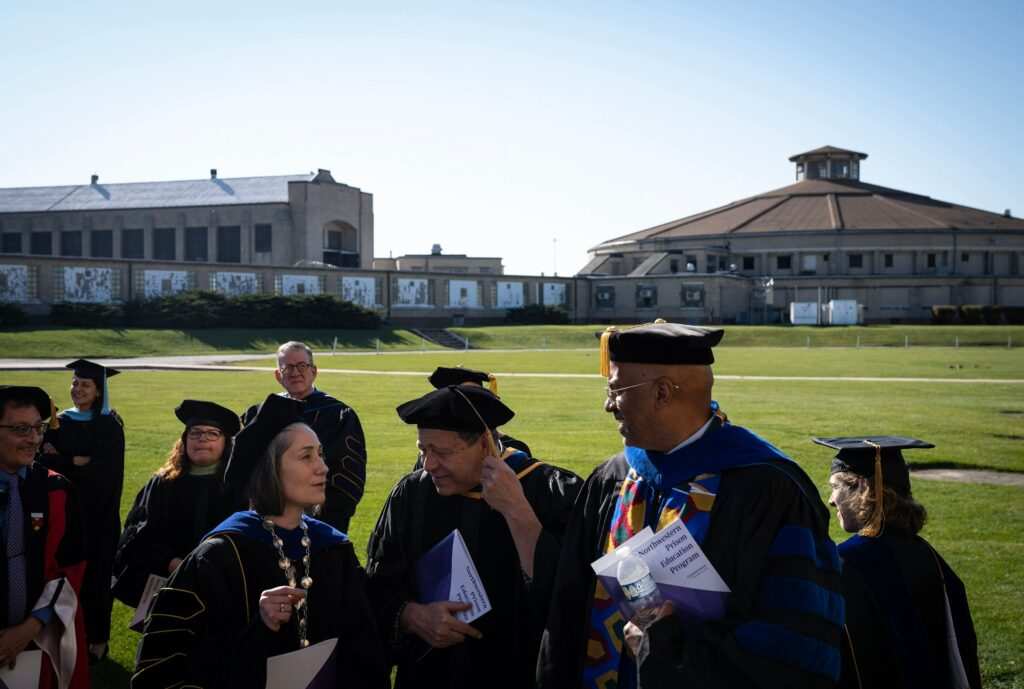
While in prison, Soto said he’s lost hope at times, feeling dejected and worthless. Getting an education helped rebuild his self-esteem, Soto said, and made him feel like a human again, even though it came with its own set of challenges.
Northwestern’s program, which is funded through a mixture of grants, donations and support from the school itself, also offers students writing tutors and wellness support.
At one point, Soto said he was in a cell about 6 feet away from Stateville’s entrance. The loud noises of people coming and going made it difficult to concentrate. Writing papers with a small pencil or pen wasn’t comfortable. But he also found his calling in the process — law.
In addition to eating a “good meal” of steak and lobster and taking an unencumbered walk on DuSable Lake Shore Drive if he were released, Soto dreams of becoming a lawyer and helping reverse wrongful convictions. He even took his Law School Admission Test a couple months ago. Soto said he doesn’t believe in opening the “floodgates” and letting everyone who has a degree out of prison, but that there needs to be more pathways to re-enter society.
“America is a place of second chances, and it always has been,” he said. “Would you rather have a person who has been incarcerated for decades come out uneducated and unskilled? Or would you rather them come out with some skill set?”
‘Recidivism is a really low bar’
Naomi Puzzello, a spokesperson for the Illinois Department of Corrections, said research shows prison education programs are a “proven strategy” in reducing recidivism. She said the department is proud to partner with Northwestern to provide “transformative educational opportunities.” The federal government restored Pell Grants for incarcerated people this year, reversing a nearly 30-year ban.
“With the return of the Pell Grant, we are hopeful current postsecondary education partners and prospective partners will expand even more high-quality, impactful postsecondary opportunities to students — it’s especially needed in central and southern Illinois,” Puzzello said.
According to a report from the Illinois Higher Education in Prison Task Force, there were 11 higher education programs serving six prisons in Illinois at the end of the 2021-22 academic year. About 640 incarcerated students, or 2.2% of the state’s prison population, participated in programming during the 2020-21 academic year amid the COVID-19 pandemic.
For Rebecca Ginsburg, an associate professor of education policy, the value of prison education isn’t something that can be measured only in terms of recidivism. Ginsburg is the director of the University of Illinois Urbana-Champaign’s Education Justice Project, one of the state’s longest-running prison education programs. It offers for-credit courses and extracurricular activities at Danville Correctional Center.
Educational programs allow prisoners to interact with people on the outside, as well as build communication and leadership skills, she said. These tools are valuable when seeking jobs and housing after release, and for simply leading a happy life, Ginsburg said.
“Recidivism is a really low bar,” she said. “My goal is not that our students are not re-incarcerated in five years after their release. My goal is that they go on to meaningful jobs and meaningful work, making an impact in their community, and that those effects are intergenerational — that the trajectory of their children and their grandchildren is changed.”
Thought-provoking discussions
In Bedi’s class, incarcerated students and law students from Northwestern sit side by side during the final presentations. The class is a blend of the two groups, allowing prisoners to share their lived experience with the criminal justice system to future lawyers, she said.
“When I first came to the prison it was a very emotional experience because it was just a different perspective. I have family who had went to prison … so I understand that aspect of it,” said Alexis White, a second-year law student. “They’re so insightful, and our class discussions are very thought-provoking.”
Some of the incarcerated students hope to join the profession one day as well. Benard McKinley, who is the first incarcerated person in Illinois to take the LSAT, is a teaching assistant in Bedi’s class.
When McKinley applied to Northwestern’s program, the 38-year-old wrote his application essay on the parallels between his and Malcolm X’s time in prison. Like the civil rights activist, McKinley said he’s tried to use his time in prison to learn. For example, while at Menard Correctional Center, he said he paid for a paralegal course with the money his family sent him.
McKinley was convicted of first-degree murder for fatally shooting a man on the Northwest Side when he was 16 years old.
“There’s not a day I don’t regret my actions. Sitting here knowing that not only I took a life, but at the same time I hurt my family,” he said. “It shows how much harm I created, and I can see a ripple effect.”
McKinley, whose sentence was reduced to 25 years, is now planning for life after incarceration. He wants to open a nonprofit legal clinic to help give back to the community, and spend time with his younger cousins.
“An incarcerated student who doesn’t have no education, maybe just a GED, and you just warehouse us and turn around and put us back there in the community, what do we have to help not only support us, but to support the family that might depend on us,” he said. “A higher education, I’m not going to say takes that X off our back, but it helps mitigate the circumstances.”
At the end of the class, the students exchange hugs and handshakes for the last time. It’s a “bittersweet moment,” White said.
___
© 2023 Chicago Tribune
Distributed by Tribune Content Agency, LLC.



